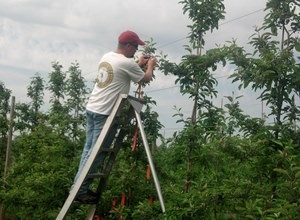
Craig Kahlke
Team Leader, Fruit Quality ManagementCCE Niagara County
4487 Lake Ave.
Lockport, NY 14094
phone 716-433-8839
cell 585-735-5448
fax 716-438-0275
email Craig
Areas of Interest
Fruit Quality and factors that affect fruit quality before, during, and after storage,
 Crops
CropsBlueberries, Raspberries / Blackberries, Strawberries, Apples, Apricots, Cherries, Nectarines, Peaches, Pears, Plums
Craig Kahlke has been an Area Extension Specialist for the CCE-Lake Ontario Fruit Program for the past six years. He specializes in Fruit Quality Management, which expands his interests to include applied research in the myriad of factors that can affect final fruit quality. Craig's primary responsibilities include harvest maturity testing of apples, postharvest storage and technology of tree fruit/berries, along with marketing of fresh produce. Food safety has been a major emphasis of his programming for the past 3 1/2 years. Craig has an M.S. in Plant & Soil Science from Texas A&M University-Kingsville and a B.S. in Biology from SUNY Geneseo. Craig has worked in agriculture-related positions in research and extension for most of the past 18 years.

Upcoming Events
African Eggplant Participatory Breeding Kick-Off
March 5, 2026
Join us to learn about the Cornell African Eggplant Research Project and learn how you can participate! African eggplant, also known as Bitterball, Garden Egg, Kittley and other names, is an important crop for many members of our community with heritage from regions such as sub-Saharan Africa, Southeast Asia, and Brazil. Since 2024, the Cornell African Eggplant Research Project has been collaborating with growers and community partners across New York to develop high-quality varieties adapted to the Northeast U.S. In this meeting, we will share information about growing and preparing African eggplant, highlight our research to date, and invite partners to collaborate with us in our 2026 participatory breeding and variety selection efforts.
COST: FREE! You must pre-register to receive the Zoom link.
Managing the Invasive Swede Midge Webinar
March 6, 2026
Swede midge is an invasive fly that causes serious economic losses to brassica crops. Due to its small size and hidden feeding habits, swede midge is often called an "invisible pest" and damage may be misdiagnosed. In this webinar, we will review the swede midge life cycle and crop damage symptoms, current management recommendations, new research findings, and highlights from on-farm case studies with a focus on organic management.
1.75 DEC pesticide recertification credits in categories 1a, 10, and 23.
Good Agricultural Practices (GAPs) Food Safety Training
March 10, 2026
Newark, NY
Learn about food safety on the farm! This event hosted by the Cornell Vegetable Program, Cornell Lake Ontario Fruit Team, CCE Wayne County, and the NYS Department of Agriculture, will cover good agricultural practices (GAPs) to help reduce the risk of microbial contamination on the farm, keeping food and consumers safe.


































